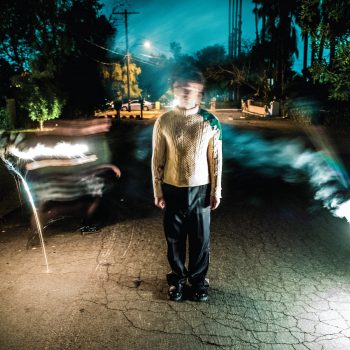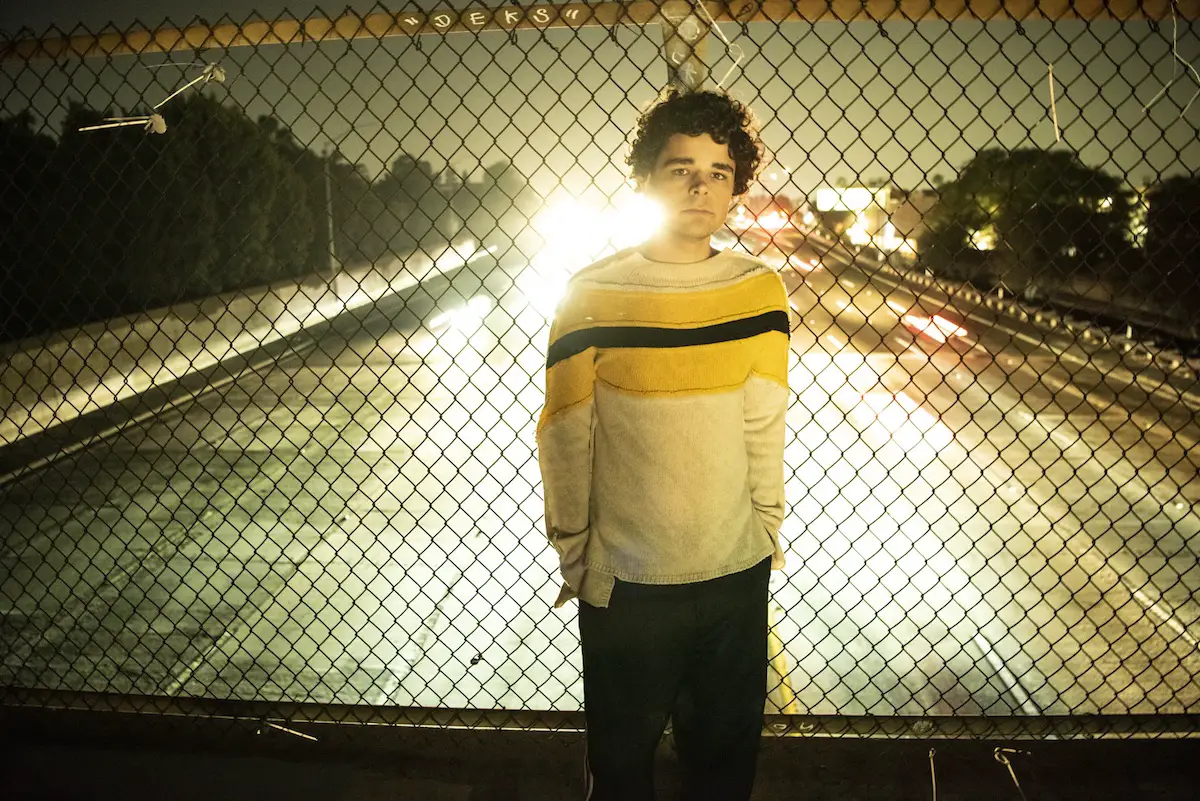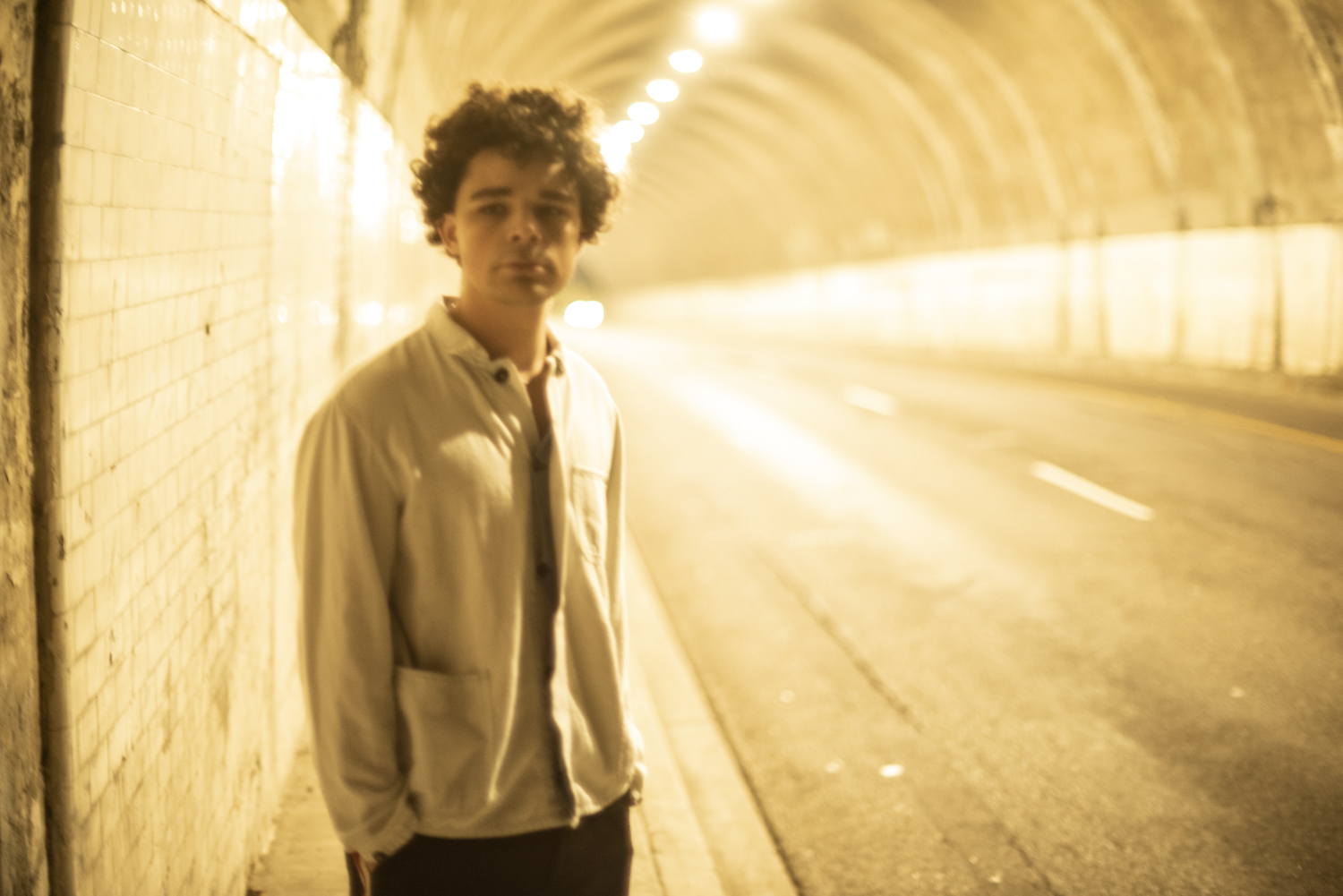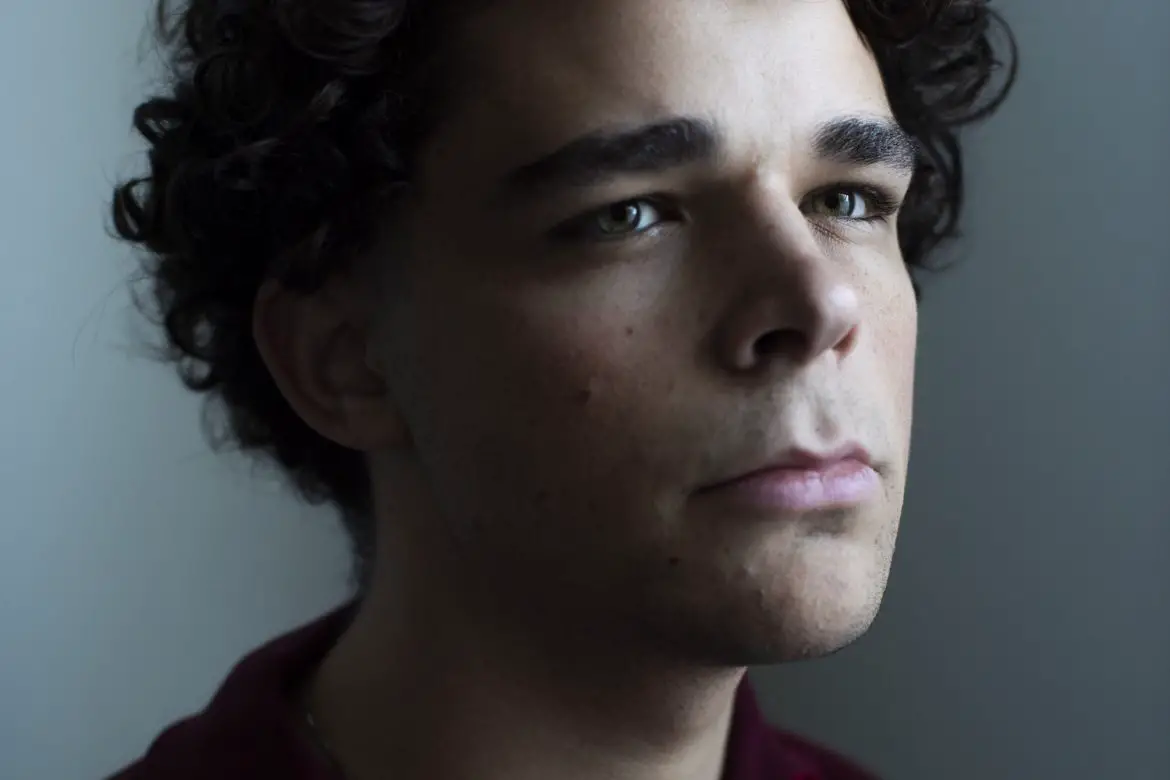Singer/songwriter Charlie Hickey sits down with Atwood Magazine to discuss young love, teenage angst, and his debut album, ‘Nervous At Night’ – out now on Phoebe Bridgers’ Saddest Factory Records.
Stream: ‘Nervous At Night’ – Charlie Hickey
Lyrically, the songs I love the most are the ones that give you a feeling that you can’t put your finger on. They put all the cards on the table, they describe something and stop at that.
Charlie Hickey is living proof that good things come to those who wait.
At 22 years old, the singer/songwriter (and longtime Atwood favorite) has released his debut album Nervous at Night (May 20, 2022, Saddest Factory Records), a sounding board for those in transition. Hickey approaches adolescence with fresh eyes, replacing cliches and miseries with stirring empathy and painstaking self-awareness. Hickey watchfully waits for “new colors” and the “impossible,” even when there is nothing on the horizon.

Hickey trades in the usual woe-is-me for a painstaking self-awareness. He carves out pieces of himself, and lays them on the table – anxieties and idiosyncrasies on full display. With cracked phone screens, Jordan Peterson’s tips, and glitter makeup, Hickey holds his memories in time, an invitation to his psyche. Hickey’s vulnerability consists of distich wisdom and head-tilting curious confessions.
In the title track, Hickey cries, “I don’t drive, I don’t have a car, I’ll still meet you wherever you are.” “Nervous at Night” and “Dandelions” feature producer and fellow writer Marshall Vore’s production. The songs buzz with an uneasy intensity, teetering on the edge of destruction. A new side of Hickey is on display with upbeat tracks, showcasing a fresh side of his artistry.
Hickey chooses authenticity over relatability time and time again. “Mid Air” is an origin story, where Hickey traces his identity back to dinner conversations and birth order. In a hazy falling of leaves, Hickey’s falsetto and acoustic guitar sing together, professing to his sister, “I think we’re two sides of the same coin, spinning in mid-air, looking for somewhere to land.” Hickey stretches his thin skin with love songs. “Every Time I Think” and “Missing Years” are graciously dedicated to lovers and the space they take up in our heads. Hickey imparts nuggets of wisdom beyond his years with “Springbreaker,” in the vehicle of an unsettling melody and haunting harmonies: “If love is shrinkin’ someone to their actual size, then I am gonna love you till we’re eye to eye.”
I was in the right place at the right time
You needed someone, you got the wrong guy
Catch and release, went swimming
When something good is happening
I feel like it’s an accident
Don’t think I can pull it off again
I don’t drive, I don’t have a car
I’ll still meet you wherever you are
Any price for the ride, living like a rich man
Didn’t ask me to, but I swear that I can
– “Nervous At Night,” Charlie Hickey
Since his childhood, Hickey has watched adulthood approach from the corner of his eye.
He holds the indescribable feelings in the palms of his hands, molding them into stories of his own. Nervous at Night is the still small voice for your every disaster, no matter how small.
I spent a lot of time as a musician trying to emulate other people. I’m trying my best to now be authentic, the artists I like the most are not trying to emulate anyone.


Atwood Magazine: Thank you so much for your time! Nervous at Night is on repeat in my house. This album sounds like a coming-of-age story. When were these songs written?
Charlie Hickey: I wrote them over the course of three or four years, almost. The oldest ones I started writing in my first year of college. I only went to college for one year, so it is literally a coming-of-age album in a lot of ways. It’s not something I thought about while making it, but hearing it now it really feels like that.
Totally. The time of life between being a kid and an adult is a bit of a broken record at times, the same listens worm their way into new experiences. What were the feelings that rose to the surface time and time again during these songs?
Charlie Hickey: I think what you just said is exactly it. In this period, there’s so much monotony. It’s the time in your life when you are the most emotional, you are having adult feelings but you’re not an adult yet. You still don’t have that freedom and autonomy, there’s a disconnect between your feelings and experiences. There’s a lot of talk about nothing happening in the album.
I think lots of people in our age group will relate to that. I know I’m always on the edge of my seat, waiting for something to happen. But it’s always the same stuff over and over again!
Charlie Hickey: That’s almost the hardest thing in life. At least for me, it’s harder than experiencing real pain!
You have this incredible ability to communicate your feelings, your songs are so immersive, scarily so at times! How did you cultivate your ability to communicate in your songs?
Charlie Hickey: I have been writing songs for a long time, and there have been different things I’ve valued in songs at different times. I think I’m realizing what is important to me in a song, which is being immersive and bringing you somewhere. The little details you wouldn’t think to include give it that extra thing. Lyrically, the songs I love the most are the ones that give you a feeling that you can’t put your finger on. They put all the cards on the table, they describe something and stop at that.
Your mom and dad are both musicians. How would you describe growing up and the effect of music in your home?
Charlie Hickey: It was awesome. I think I wouldn’t be in this place if I didn’t see it as a tangible life path. Aside from the fact that it was all around the house, both my parents did it for a career. That idea felt normal for me while some people are up against their parents judging them for their life paths. I’m lucky I didn’t have to deal with that (laughs). I’ve never really thought about doing anything else.
How has your attitude towards music changed from your childhood?
Charlie Hickey: That’s an interesting question. I think I know more about what is important to me in music, like I was saying in songs. You know you go through phases as a kid, there was a time where I was listening exclusively to Nirvana and Incubus. I spent a lot of time as a musician trying to emulate other people. I’m trying my best to now be authentic, the artists I like the most are not trying to emulate anyone.

There is an empathy in your lyrics, especially when you write about others. It’s a contrast to the way you describe yourself, using words like “small,” “dumb,” “missing”. Why do you think you tend to be tougher on yourself than the other party in the relationship?
Charlie Hickey: That’s an interesting observation. I think writing about other people without empathy is never a very interesting thing to do. Even if it’s cathartic, it ends up reflecting badly on you. I’ve written angry songs, but there can also be lots of empathy in there. Anger can either be some awareness or it can be only a part of the truth.
“Choir Song (I Feel Dumb)” and “Thirteen” similarly have this “outsider looking in” perspective. Is that a conscious theme you strive for?
Charlie Hickey: I think those were things that were true at other times. There were times I was more within myself and other times where I felt more removed and anxious. I’m interested to see what the next songs I write will be like! I’m a bit more confident in certain areas now. Self-deprecation is a tricky thing in music, it’s a fine line to walk. It can get self-indulgent, and there are times when it’s not necessarily the most interesting thing to hear. I like songs that are really melodramatic, but I also like songs that are intellectual. The role that perspective plays in that way is really interesting, whether the narrator is caught up in their emotions or understands their emotions.
I wanted you so bad I couldn’t look you in the eye
Took me in the bathroom stall
I broke my phone screen on the tile
It felt poetic
You regretted it, you’re right
I made an Irish exit
Never been good at goodbyes
Now I feel dumb
I look stupid in front of everyone
Preachin’, teachin’ the choir a song
You wouldn’t tell me to shut up
But I think that’s what you want
Can you talk a little bit more about the recording process? How was collaborating with your friend, Marshall Vore?
Charlie Hickey: It was a non-linear recording process. We approached each song as a separate project, there was no real cohesive vision for the album. All the songs were written on an acoustic instrument, and some of them ended up in different places. There are songs on the record that Marshall had started, and there are songs where I wrote essentially myself, with Marshall playing more of an editing role. He’s obviously an amazing songwriter, and it was really helpful to have him in the room.
“Dandelions” and “Nervous at Night” have an “on the edge of your seat” feeling. The upbeat tracks are different from your past EP. How do you think this sound changes the story you are trying to tell?
Charlie Hickey: I like when songs are sad or melancholy but have an energy to them. There’s more of an anxious energy about them, more yearning and agitation.
You take on big themes in your songwriting. What role does songwriting take on in your personal processing?
Charlie Hickey: I don’t know if it does (laughs). I think it informs the songwriting more than the other way around. I’m an over-thinker, so the chances are I’ve thought something through already.
Do you find yourself needing a certain amount of distance before starting to write about something?
Charlie Hickey: Yeah, totally. That’s usually how it goes. That’s something I’ve thought about a lot recently. There’s a risk in writing about something after it happens and it being too melodramatic. I like when there are unreliable narrators in songs, but more when they are choices instead of a lack of self-awareness.

What are some of the songs that helped you (or are still helping you) transition from childhood to adulthood?
Charlie Hickey: Songwriters like Elliott Smith and Conor Oberst were some of my first big inspirations. Matt Berninger (The National) and MUNA were also major influences.
I really like this lyric from “Month of September”: “But I don’t wish that I was a kid again, I just want something good to be coming.” How do you approach the good, big stuff in life?
Charlie Hickey: That is something I’ve been thinking about a lot while touring. It’s either everything happens or nothing happens. It’s really disorienting, and you have to figure out how to be happy on a daily basis when something isn’t happening. I’m going to be home for a long stretch of time for the first time in a while, but I’m looking forward to it. That song is about being a musician, and how we are programmed to look at the next thing.
— —
:: stream/purchase Nervous At Night here ::
— — — —

Connect to Charlie Hickey on
Facebook, Twitter, Instagram
Discover new music on Atwood Magazine
? © Frank Ockenfels
:: Stream Charlie Hickey ::









